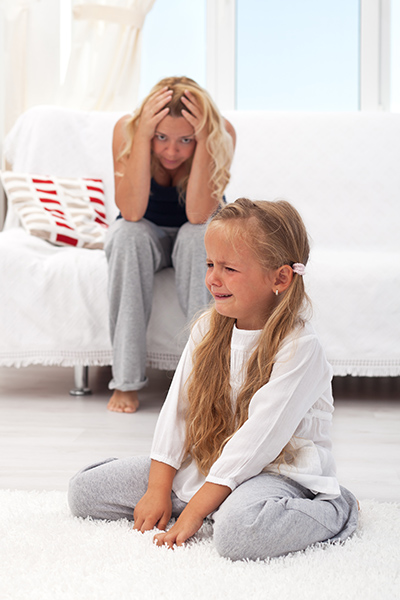Has your little love suddenly become prone to meltdowns, screaming, tummy aches, or waking at night? A global pandemic is stressful for anyone no matter their age. Our children often go on as if nothing is bothering them but they are just as stressed, confused, and scared as we are and those big feelings eventually erupt. If your child has changed, stress could very well be the reason why. They have a different way of processing and showing their emotions and they need to be helped along the way.
This guide will help you identify the signs of stress in your child, how it can adversely affect them and how to help manage it. These strategies are critical when life gets stressful.

Signs of stress in children:
- Behavior changes
- Changes in eating habits
- Feeling sick
- Changes in sleep patterns or bedwetting
- Nightmares
Behavior changes

If you find yourself saying, “this is not like my child to act this way!” then you really need to consider why their behavior has changed. It is so easy just to react to bad behavior without considering the root cause. This is true for people no matter their age. If your husband or best friend is acting strange, you would likely ask them what was wrong. The same is true for our children.
Kids have a much harder time expressing themselves and so their fear, frustration, uncertainty, and stress can come out in bizarre ways.
If it is out of character for your child, consider that it might be due to something you aren’t aware of. It’s not an excuse for bad behavior, but it helps to understand and then handle it appropriately.
Changes in eating habits
Stress has been shown to increase the consumption of less healthy food and increase emotional eating. It can also cause a child that normally eats well to become picky, fussy or not want to eat.
Let me be very clear and point out that a study that shows an “increase” in certain things does not mean it is guaranteed. However, it is something to keep in mind and keep an eye on. If you notice that your child has changed their food preferences, doesn’t want to eat or is eating all the time, use this information to brainstorm possible reasons. Stress? Growth spurt? Changing taste buds? There are plenty of possibilities.
These changes in eating habits can just be one indicator that stress is affecting your child. This is especially important as this can lead to habits that follow the child into adulthood.
Feeling sick
Upset tummy, headaches and body pains are common indicators of stress in children. If your child is complaining of feeling sick, it should always be investigated under the guidance of your pediatrician. However, it is helpful information for your doctor if your child has been under any kind of stress. Big test at school? New baby in the home? Parents fighting? These stressors can all manifest as feeling sick.

Change in sleep patterns or bedwetting
Sleep is incredibly important for all children, especially young children. We have all experienced a little love who is overtired and really needs a nap. The cranky critter is clear evidence of how important sleep is.
Most kids occasionally wake up at night because of a bad dream, needing a drink or to use the bathroom and this is considered normal behavior. If your child suddenly breaks from their normal sleep habits or starts wetting the bed, this could indicate a problem.
It may not be as well known that disruptions to sleep can have very serious consequences (both in adults and in children). Changes in sleep patterns can “result in psychological (irritability, mood changes), physical (obesity, accidents), behavioral and academic problems (inattention, oppositionality)” (NIH). These problems can linger into adult life if not treated early. Ongoing stress contributes to changes in sleep patterns and needs to be addressed.
Studies have indicated that stress in parents can impact a child’s sleep patterns.
We must figure out how to manage our own stress and model good practices for our children. Let me be very clear here – parents are not perfect and showing your stress or losing your cool on occasion is not going to damage your children. But it is important to know that the research also clearly shows that the greatest influence on how children manage stress is their parents. It can be a heavy load but we must carry the burden for our children. We must protect them and make them feel safe. You may KNOW they are safe, but they have to FEEL it. I know that if I lose my patience and get very angry, they feel less safe. Knowing this helps me regain my cool and handle the situation differently.

Nightmares
Pay attention to what your child tells you about their dreams because often dreams are the brain’s way of processing things and can indicate something your child is focusing on or stressed about.
Talk about the nightmares during the day if possible so that bedtime stays light and fun. Help your child create a positive “movie” in their head to help them drift off to sleep by using descriptive words to tell a pleasant story or remind them of a fun time. Don’t let them watch scary shows and movies if possible.
If they wake up from a nightmare and come to you, comfort and snuggle them until they are reassured and calm. Don’t make a big deal of it but be comforting. This can be hard for some of us who really don’t like being woken up in the middle of the night (me, I’m talking about me), but I know being impatient or grumpy isn’t helping them at all. I don’t always succeed but I try to be patient and give them the time they need to calm down. Most children will quickly fall back to sleep.
Effects of stress on children
Reading the research on the effects of stress on children is scary. As a mother, I feel like I am guaranteed to totally screw up my children. But when you look carefully at what the research says, it primarily talks about severe and prolonged stress. The effects of that can truly be devastating – health issues, mental health problems, and academic failures.
Not all stress is bad, it’s the length and severity that matters most. Stress is how our brains react to something unknown or scary in our environments. I’m sure you have heard of the fight or flight response. As modern humans, we don’t often have to fight nor flee, but our brains don’t know that. The world the brain evolved in was actually more simple. You had to find food, avoid predators, and survive to reproduce. In modern times the burdens, worries, and things we see in the media, are all stressing us out on a daily basis and it is an overload for our systems.
Unfortunately, our stress as parents nearly always trickles down to our children. No matter how much you think you are keeping it from them, I promise, they know something is wrong. If you are struggling with managing your own stress, ask for help. Your kids are worth it.

How to help your child manage stress
Provide stability and routines.
Children absolutely thrive on routines and knowing what to expect. Even if they fight you on it, trust me, they want the security. This is pretty intuitive for younger children, we know they need to eat at set times, have a consistent bedtime, and have a pattern to their day, but is also true for older children.
Teaching high school in a school district where the students had a wide range of issues taught me (among many things) that teenagers also need structure. I had very strict rules with clearly defined consequences and everyone was treated equally (there were no favorites). Many of my students were not used to that and they would test me over and over again. It took many weeks for them to realize I was serious and would always follow through. Eventually, the classroom fell into a familiar routine and I could sense the kids relax. Behavior issues lessened and the classroom was a happier place.
Routines and consistency will provide the same thing for your family. Your children will feel safe and thus less stressed when they know what to expect.
Be a role model for how to handle stress.
If you make a mistake or get too upset, own it, and apologize. Give an age-appropriate explanation for what happened and how you were feeling. Be as honest as you can be about scary situations based on the age of your child. Your kiddos see, hear and understand more that you probably realize. They can tell if something doesn’t make sense or if you are lying.
Prepare kids for big changes.
If something is changing or might be scary, don’t spring it on children at the last minute but don’t drag it out too long beforehand either. I will often wait until the day before or perhaps several hours before something that might be scary or stressful. I won’t lie to them though. If we are going to the doctor and my kiddo asks if they are getting a shot I will tell them the truth. Often the truth is, I don’t know! And that’s ok. Reassurance that you will be there for everything is often all they need. Lying to your children so they are not afraid just causes them to mistrust you once they realize the truth. Do not break that precious trust!
You know your child the best so figure out what the best timing is. Maybe they need a little more time to process things and ask questions. Maybe if they think too long about something they start to freak out a little bit. Pay attention and tailor your timing to each individual child.
Monitor what they are watching and hearing.
I do not have the news on when my children can hear it. They only watch very age-appropriate, fun, light, or educational shows. There is way too much scary stuff on and things that I don’t want to have to explain to my little ones! They aren’t old enough to process this stuff. When in doubt, find something else!
I have even been extremely frustrated at movies that are rated “G” but I think are totally inappropriate! You may even recall some scarring movies from your own childhood. I was scarred for life by Old Yeller, Bambi, and The Neverending Story (that horse sinking in the quicksand! I will never forget). We can’t protect our children from every single thing, but this is an easy one to fix.
Common Sense Media is a great online resource to help you make good choices about the media your child consumes. You can’t always watch everything first or even sit there with them, so this is a great tool to have.
Learn how to listen without judgment or wanting to fix everything (oh, this can be so hard!)
As a mom, we just want to fix everything. We have the answers (usually), but our answers are not what is always needed. Pause, take a breath and just listen. Help your child process things by asking questions and reiterating what they are saying. “I hear that you were really scared when that car went speeding by us.” Let them know that you are really listening and understand what they are saying. For kids of all ages, this is all they really want. To feel heard and understood.
Help them to solve the problem for themselves if possible and offer them comfort and support. You will still get to fix things this way, it will just take a little longer. Learning this problem solving is possible starting at a very young age, just keep things age-appropriate.
Talk to your child about scary things.
Right now it’s a global pandemic and next, it might be something they saw on TV or at a friend’s house. Our family once witnessed an out of control driver on a major highway. He then crashed into three cars on the off-ramp of the highway. We pulled off the same exit only moments after it happened. I was scared, trying to record the suspect as he fled the scene while also worried about my children in the car. The car he was driving was smoking and within minutes was fully engulfed in flames. We were no more than 30 feet from the burning car and couldn’t move because of the traffic that had built up behind us on the ramp.
Talk about scary! For weeks both kids talked about it and asked questions. You could see them trying to process it all through their questions and retelling what happened. They told random strangers in the store about it. We patiently listened, reassured them, and shared our own feelings. Even if your child wants to talk about something over and over again, it’s part of their process. Remember, your little human isn’t a clone of you. They have their own ways of dealing with thoughts and emotions. As in any relationship, it can be hard to see things from a different perspective and understand a person’s thinking. Inherently we fear things we don’t understand but it’s important to try to understand.

Be active!
Get outside and have plenty of active play for yourself and your children. It is a well-known fact that fresh air and exercise are good for mental health. Laughter and movement are natural antidotes to stress. Get out, be active, and have fun! Even on the days it is hard to get going and you just feel like relaxing, trust me it will be worth it.
In the end….
Stress is an insidious thing that doesn’t always show it’s effects right away. We have to be so mindful of what happens in our homes and in front of our children to try to mediate these effects.
This isn’t something to stress yourself about, simply follow the advice given here and you will be well on your way to helping your child cope with stress. Modeling your own stress management and being open in your conversations (in an age-appropriate way) will give your child the skills they need to get through an unavoidably stressful life.
As always, The Balanced Mom Life team is here to support you in any way we can. Please feel free to leave a comment here or email us your suggestions, questions, or concerns.
If you found this helpful please share on social media and send it to your friends so more amazing moms (and dads too!) can have the tools they need to help their children cope with stress! We want to support as many families as possible!
You are amazing, beautiful and a fantastic mother! Don’t ever forget that.
References:
https://www.apa.org/topics/children-teens-stress
https://www.ncbi.nlm.nih.gov/pmc/articles/PMC4504742/
Stress eating can start in early childhood – University of Michigan


Leave a Reply